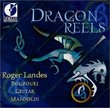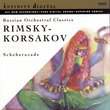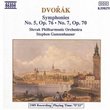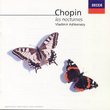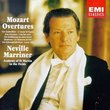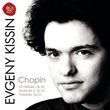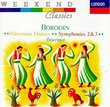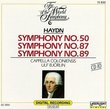| All Artists: Antonin Dvorak, Neeme Järvi, Royal Scottish National Orchestra Title: Dvorak: Symphonic Poems Members Wishing: 1 Total Copies: 0 Label: Chandos Release Date: 4/13/1999 Genre: Classical Styles: Forms & Genres, Theatrical, Incidental & Program Music, Symphonies Number of Discs: 2 SwapaCD Credits: 2 UPC: 095115240328 |
Search - Antonin Dvorak, Neeme Järvi, Royal Scottish National Orchestra :: Dvorak: Symphonic Poems
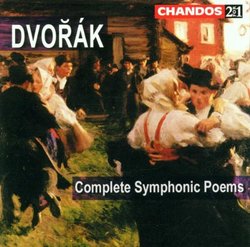 | Antonin Dvorak, Neeme Järvi, Royal Scottish National Orchestra Dvorak: Symphonic Poems Genre: Classical
No Description Available. Genre: Classical Music Media Format: Compact Disk Rating: Release Date: 20-APR-1999 |
Larger Image |
CD DetailsSynopsis
Product Description No Description Available. Genre: Classical Music Media Format: Compact Disk Rating: Release Date: 20-APR-1999 Similar CDs
Similarly Requested CDs |
CD ReviewsJarvi and the RSNO do Dvorak's glitter and gore proud! Ryan Sweet | Canton, OH USA | 10/19/2000 (5 out of 5 stars) "This 2-CD compilation is one of Chandos's generous reissues of "fillers" that accompanied Jarvi's performances of Dvorak's symphonies, but as other critics have noted, these tone poems are much more than a few extra minutes of music pinned to end of a CD. Instead these beguilingly childlike but often rather grisly works are models of late-Romantic music-making writ large. Except for the 1894 opus 62 and the opus 111, Dvorak's last orchestral piece, the music in this set is based on some folk ballads written by Dvorak's compatriot Karl Jaromir Erben, a sometime poet. The fairy tales each tell a chilling story often interspersed with gore (I'll let you find out the details, which Gerald Larner's lucid liner-notes handle beautifully), but Dvorak is hardly put off by the subject matter and paints a gorgeous program in sound for each one, filling all with one heart-easing (or heart-rending, when necessary) melody after another. Highlights include the lovely lullaby for the half-goblin baby in the center section of The Water Goblin, the King's warmly grand tune and the Janacek-like obsessing string-figures for the three gruesome exchanges in The Golden Spinning Wheel, and the poignant conclusion to The Wood Dove. So what of Jarvi's performances of these fascinating works? I looked at the playing time of some of these pieces (27:02 for the Spinning Wheel alone) and thought I might get bored by a certain symphonic sameness, which can often be the case with lesser-known Dvorak conducted and played without even the last ounce of concern, but this was never the case here. Jarvi and his Scots play every note with interest and loving conviction, so that the tales engross and entertain, as Dvorak knew they could. The sound is vintage Chandos, reverberant as many recordings are from this source and venue (Henry Wood Hall) but sonically spectacular: the engineers handle the fortissimo marching figures at the opening of the Spinning Wheel with the same attention as the breathless entry of the Noon Witch in that tone poem. All-in-all, an unusual bargain and an absolute must!" Arguably the Definitive Set of Dvorak Symphonic Poems Yi-Peng | Singapore | 01/08/2005 (5 out of 5 stars) "This 2-CD set of Dvorak's complete symphonic poems should arguably be considered the definitive choice for anyone who wants a complete recording of these pieces. Although the two great Dvorak interpreters, Kertesz and Kubelik, have made recordings of these pieces, Jarvi's set should arguably be considered a more appealing and engaging interpreter of these underrated gems. Jarvi's interpretations tend to be more vivid than his illustrious predecessors and the Scottish National Orchestra players respond well to his inspired direction and to this rarely-heard Dvorak repertoire, with the atmospheric and reverberant Chandos recording allowing the listener to immerse himself in the grisly and grutesque fairy-tale world of the Erben ballads that inspired these four works. Jarvi highlights many nuances in the four poems, from the drama of The Noonday Witch to the exotic surroundings of the Water Goblin, from the frightful incidents in The Golden Spinning-Wheel to the misleadingly pastoral Wood Dove, and the vividness of his interpretations make you wonder why people don't consider these pieces as durable as the New World Symphony. Jarvi's set is the only complete set of Dvorak symphonic poems to include the rarely-heard Hero's Song, with its bold, swaggering character and a forward drive the typefies some of the Mahler symphonies. This is as well-played as the Erbenesque poems and the My Home Overture, which makes a fitting fill-up to this set with its homage to a Czech playwright. An added bonus is the superb and lucid booklet notes by Gerald Larner, featuring all the details of the symphonic poems to guide the listener along. This set is now doubly attractive at a superb bargain price. All-in-all, a must-have for any Dvorak lover." Fantastic performances Prescott Cunningham Moore | 03/28/2004 (5 out of 5 stars) "As typical with this conductor, Jarvi delivers here were he similarly struggled with the symphonies - maintaining tension and weight throughout the performances. And while I certainly would not want to be without Kubelik or Harnoncourt in this music, Jarvi's colorful and vibrant performances are so much better than most of the competition, including Rattle's recent, uneventful Berlin recordings of the four tone pomes.
Here, of course, we get the added bonus of the rarely heard Hero's Song, a melodically rich but somewhat diffuse pome. However, it has all the sings of mature Dvorak and works towards a final preoration in the grand manor. The four poems, however, have tighter constructions and have more apparent stories. And Jarvi really captures all the nuances and delightful orchestral effects that abound in these works. Just listen to the final battle between the Goblin and the Maiden, where the brass of the then Royal, now National, Scottish Orchestra are really fierce and violent, but still do not swallow up the shrieking winds. The Noonday Witch is equally fine, Jarvi really getting the winds to create some ghoulilsh sounds. In the Wood Dove, the final passages have rarely been so well done or so touchingly tendered. And Jarvi keeps the reigns tight in the ambling Spinning Song. As typical with this source, Chandos has a bit trouble with the orchestra, which sounds distant and overly-reverberant. Winds could be a tab more colorful and the strings, typical of British orchestras, can be slightly muddy. As least as playing goes, Harnoncourt's Concertgebouw, with its famed woodwind and burnished brass, reign supreme. But then again, Harnoncourt can always be a liability for some (although he is rather uncontroversial in his Dvorak, save for a somewhat meandering performance of the Seventh). Jarvi, on the other hand, simply revels in the beauty of these scores and whips up some pretty fantastic excitement from his players. Bravo." |

 Track Listings (3) - Disc #1
Track Listings (3) - Disc #1


